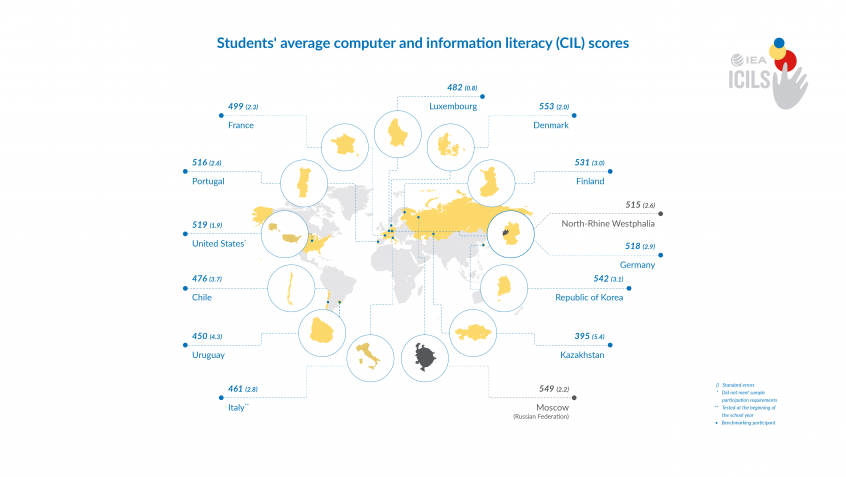The second cycle of IEA’s International Computer and Information Literacy Study reveals that just 2% of students demonstrated an ability to critically assess information found online.
ICILS is a large-scale, international assessment of grade 8 students’ computer and information literacy and computational thinking skills. It addresses a question of critical importance: how well are students prepared for study, work, and life in a digital world?
This cycle (ICILS 2018) has seen more than 46,000 students and 26,000 teachers take part. ICILS 2018 also gathered valuable background information about students’ and teachers’ use of, and attitudes towards, technology.
ICILS deals with the core knowledge, skills and understanding students need to succeed in our dynamic information environment. ICILS provides countries with reliable, comparable data about young people’s development of 21st century computer and information literacy (CIL) skills. On top of this, ICILS is unique in directly assessing computational thinking (CT) skills of students.
The results of this second cycle of the study call into question the generalization that young people are “digital natives” who through exposure to the use of digital devices develop expertise in their use. The study demonstrates that providing students and their teachers with information and communications technology (ICT) equipment alone, does not automatically result in the development of sophisticated digital literacy skills. Students need to be taught how to use computers effectively, and their teachers need to be supported in their use of ICT in teaching.
Commenting on the results, IEA Executive Director Dr Dirk Hastedt said:
“It is pleasing to find that, across the participating education systems, on average, students and their teachers have positive attitudes towards ICT in education and society, even though they acknowledge potential areas of concern.
“Furthermore, most students reported learning about computer and information literacy issues at school, with 74% saying that they have been taught how to search for information using ICT at school. It is encouraging to see that most students in the participating systems have access to software related resources for learning.
“Nevertheless, ICILS 2018 revealed the impact of socioeconomic status on digital literacy. On average, students from higher socioeconomic status backgrounds had significantly higher computer information literacy (CIL) scores. Students with a parent who had completed a Bachelor’s degree or higher had a CIL score 31 points higher than students whose parents do not hold a degree.
“This cycle of ICILS has seen a diverse selection of fourteen countries and benchmarking entities taking part; from Korea to Kazakhstan, France to Finland, Uruguay to the United States. It is striking however, that despite their diversity, we have observed a greater difference in achievement levels within countries than between them.
“Confidence, and crucially, competence, in the use of digital devices is of vital importance globally. It is essential that young people are taught these skills at schools, and that their teachers are well supported in delivering this bedrock of modern education.”
Commenting, Study Director, Julian Fraillon said:
“This cycle of ICILS is the first time an international large scale assessment has directly measured students’ computational thinking (CT) skills. This is really exciting as a researcher, because it gives us an insight into how well young people can break down problems into manageable chunks, analyze problems, look for sequences, and ultimately create the step-by-step sequenced instructions in order to complete a task.
“ICILS also provides rich information on the contexts in which students develop both CIL and CT skills, including how educational systems, schools and teachers seek to support student learning”
“We’re all excited to see how the ICILS data will be used to support continuous improvement in education relating to these essential skills in the digital world and we are greatly looking forward to further develop ICILS for the next cycle, which will take place in 2023.”
Please see the press release for full information
Follow the live webstream of the international results (10am EST, 5 November 2019)

